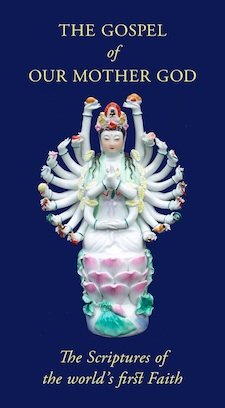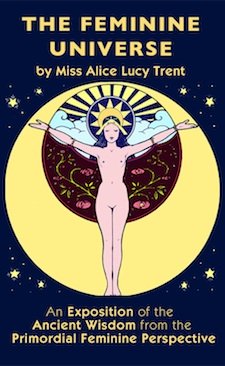Notes on Descartes, Imagination and "Reality"
Descartes, imagination and reality enter into this challenging discussion on how we can actually distinguish between what is "imaginary" and what is real.
Fantasy author Annalinde Matichei commented:
Modern people have to make certain assumptions in order to live, because they live without a metaphysical basis (and this is equally true whether they are “religious” in the limited modern Western sense of this word or not.).
Some of these assumptions are the broad ones, like the assumption of a nice, solid predictable Newtonian mechanist universe – which has actually been exploded by relativity and then by quantum physics around a century ago: but the mechanist/materialist model of “reality” is still the “exoteric faith” that the modern mentality depends on.
But on the more “microcosmic”, or personal, level this faith consists of emotional axioms like:
• “We can trust our memories” – but to a large extent, we can’t.
• “We can know other people” – actually, on the level modern people try to know people, that isn’t possible either – as they are constantly finding out to their horror.
• “The things we experience with our senses are true” – which we cannot prove, is demonstrably not always true, and in any case is no more reliable than our unreliable memories allow it to be.
What is particularly fascinating is that the attack on the traditional mentality began (at least in one of its prongs) with an attack on this very last proposition (that the evidence of our senses is true) by Descartes.
Descartes demonstrated very clearly that we have no reason for believing that our apparent physical-sensual experience is "real" and concluded that the only possible certainty is “I think therefore I am”. Even this already imports some quite unproven assumptions about individuality; but more importantly, there is no possible step beyond the cogito ergo sum in the absence of the traditional understanding of Pure Intellect. Logically and legitimately, empirical thought stops right there and can go no further.
The history of the subterfuges and false logic by which the mind attempts to solve this dilemma without any basis in Principle is, in fact, the history of modern Western philosophy.
So how does traditional thought solve these fundamental uncertainties?
Our starting point is not “I think therefore I am”. This is unwarrantable because we have not proved the existence of any “I”. What we may legitimately say is:
“I think (that is something has the sensation of thinking) therefore Being exists (and can clearly, in at least one case, take on the appearance of a subjective “I”).
We can also say that there is in Being a subject and an object – even if that object be “imaginary” – without which thought is impossible.
Now do we have any means of moving beyond that point? Descartes had no means of moving beyond the cogito, and had, quite explicitly, to give up and “cheat in” the material universe. This is the Fundamental Cheat upon which the whole of modern Western philosophy is based.
Indeed, modern atheist/agnostic materialism is the most blatant intellectual fraud in history. Its foundation-statement is: "We will ignore everything but the material universe because that is the only thing we can prove to exist", while its entire history is the history of evading the fact that it cannot prove that.
Can we do any better?
What Tradition has always taught and still does wherever it is still intact – in the Chinese tradition, the Indian tradition, the Platonic tradition (which is a continuation of the earlier Western tradition), the South American traditions, etc, etc – is that we have another source of information beyond the physical senses, and that this Source deals not in the possible and contingent, but in Certainty.
This Source is the Solar Intellect, situated in the Heart – the heart of each individual being, which is also the Heart of Being Herself. This is the only pure Source of knowing because in it the Knower and the Known are One. It is this and this alone that validates the other laws of thought that are reflected on the lesser, reflective or mental, level (situated in the brain).
For the post-Cartesian West, of course, nothing validates those laws of thought. They are just cheated in with “oh they must be true”. Why must? Descartes in his original daring phase would reject that with derision, though of course he had to cheat it all back later because he had no other possibility.
La Petite Sorcière replied:
Honored Miss Matichei, you are right to suggest that in order to distinguish “real” from “imaginary” we need some criteria as to what both might constitute.
Descartes begins by suggesting that all our senses may deceive us or that we may be victims of an “evil being” who may give us our sense-impressions, thus creating a false universe.
The problem here is that Descartes has already imported some very simplistic and childish notions about “reality” versus “falsehood”. In fact we clearly know that an apparent material world exists. Whether it is “real” or “imaginary” requires us to define those two terms. Traditional philosophy (Vedantic and Platonic, to give two obvious examples) states quite clearly that the world is illusion. But that is in the light of having a criterion of Realness: the Absolute. In comparison to the Absolute, all relative things can be called unreal or illusory.
What is Descartes’ criterion of realness? In fact he has none. It is just the childish assumption of a self-existent physical world that somehow “wouldn’t be real” if it wasn’t physical. This is not First Philosophy, it is merely a set of un-thought-out, bourgeois assumptions that there "should be" (because bourgeois culture is built around it) a “real” material world and a “real” ego.
And it is on this sort of thing that the “thought” of modern Western rationalism is founded!
And it is minds thinking along Descartes’ childish lines, but immeasurably inferior to Descartes himself, that presume to tell us what is “imaginary” – and even expect us to listen.
I think not.
Miss Sushuri Madonna commented:
Would I be wrong in thinking here that the underlying and unspoken fallacy behind Descartes’ “deceptive evil being” notion is that there must actually be a material world in the sense that we think we perceive it? If an “evil being” is deceiving us into thinking we are perceiving a material world, the unspoken assumption is that this being is also hiding the real material world from us. Otherwise what would this distinction between “real” and “false” actually mean?
Herthelani are actually perfectly comfortable with the idea that the material world is (so to put it) a level of dreaming. That is why when we say that Sai Herthe is not necessarily a physical planet and does not necessarily exist in physical terms, while many Tellurians may say “Oh, it isn’t real then” – to us it doesn’t mean anything of the sort. It is neither more nor less real than planet earth and the apparently-material universe that surrounds it. And there is no reason to believe (as Descartes actually did prove, though he couldn’t correctly process what he had proven) that there is any such thing as a material universe anywhere – there may just be various self-consistent layers of “dream”.
“Dream” in itself can be a somewhat confusing term if seen through modern-rationalist eyes, because it implies a “waking state” that is more “real”. But of course from a traditional perspective the true Waking State is Oneness with the Spirit Herself. Everything other than that constitutes, on the fundamental level, various layers of illusion.
Now read:
The Traditional World-View vs the Modern World-View
Please support the Chapel of Our Mother God
Send Questions or Comments on Descartes, Imagination and Reality
Chapel of Our Mother God Homepage
All written material at the Chapel of Our Mother God is copyright. Should you wish to reproduce any portion please contact us for permission.
Facebook or Twitter
This section:
Ancient Truth and Modern Thought
Gospel of Our Mother God
The Gospel of Our Mother God is a collection of inspirational texts, prayers and daily inspiration for the Mother-Faith devotee or household.
The Feminine Universe
The Other Philosophy
Everything you have ever heard comes out of the patriarchal world-view. Its materialism, its religion, even its feminism. Here is the other way of seeing the world; the natural way: the way that everyone saw things before patriarchy and will again when patriarchy is long forgotten.

